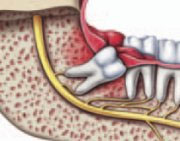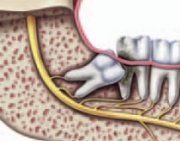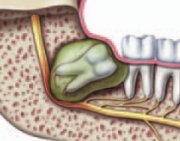Wisdom teeth
Wisdom teeth, also known as third molars, are the last teeth to erupt in your mouth. This generally occurs between the ages of 17 and 25, a time of life that has been called the “Age of Wisdom.” There is common complaint with the appearance of wisdom teeth that a severe pain is felt into the whole mouth.
Impacted Tooth
A tooth becomes impacted when there is a lack of space in the dental arch and its growth and eruption are prevented by overlying gum, bone or another tooth. A tooth may be partially impacted, which means a portion of it has broken through the gum, or totally impacted and unable to break through the gum at all. Impacted and partially impacted teeth can be painful and lead to infection. They may also crowd or damage adjacent teeth or roots. More serious problems may occur if surrounding tissues of impacted tooth become filled with fluid and enlarge to form a cyst. As the cyst grows it may hollow out the jaw and permanently damage adjacent teeth, the surrounding bone and nerves.

Sergejs Grihanovs
Must the Tooth Come Out if it Hasn’t Caused Any Problems Yet?
Not all problems related to third molars are painful or visible. Damage can occur without your being aware of it.
As wisdom teeth grow, their roots become longer, the teeth become more difficult to remove and complications become more likely. In addition, partially or totally impacted wisdom teeth are more likely to cause problems as patients age.
No one can predict when third molar complications will occur, but when they do, the circumstances can be much more painful and the teeth more difficult to treat. It is estimated that about 85% of third molars will eventually need to be removed.
When Should I Have My Wisdom Teeth Removed?
Wisdom Teeth Growth by Age
It does not worth to wait until your wisdom teeth start to bother you. Earlier removal of wisdom teeth results in a less complicated healing process. We strongly recommend that wisdom teeth removed by the time the patient is a young adult in order to prevent future problems and to ensure optimal healing. The researchers found that older patients may be at greater risk for disease, including periodontitis, in the tissues surrounding the third molars and adjacent teeth. Periodontal infections, such as those observed in this study, may affect your general health.
Wisdom teeth are easier to remove when the patient is younger, since their roots are not completely formed, the surrounding bone is softer, and there is less chance of damaging nearby nerves or other structures. Removal of wisdom teeth at a later age becomes more complicated as the roots have fully developed (may involve the nerve), and the jawbone is denser.
What Happens During Surgery?
Before surgery, your dentist will discuss with you what to expect. This is a good time to ask questions or express your concerns. It is especially important to let the dentist know about any illness you have and medications you are taking. The relative ease with which a wisdom tooth may be removed depends on several conditions, including the position of the tooth and root development. Partially or totally impacted wisdom teeth may require a more involved surgical procedure. Most wisdom tooth extractions are performed in our practice under local anaesthesia.
What Happens after Surgery?
Following surgery, you may experience some minor bleeding. Swelling, discolouration of the overlying skin and mild discomfort will develop, increasing for the next 72 hours which are part of the normal healing process. Cold compresses may help decrease the swelling. Medications such as antibiotics, painkillers and an antiseptic mouthwash prescribed by our dentist can help manage the discomfort. You may be instructed to modify your diet following surgery and later progress to more normal foods.

Infection

Crowding



